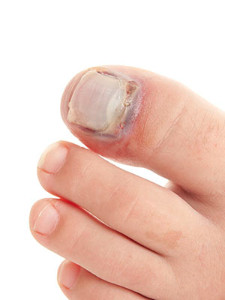NJ (908) 688-5577
NY (212) 737-2528
 Stubbing your toe on a piece of furniture or dropping something on your foot may result in a painful toe fracture. Most fractures heal in 4 to 6 weeks with proper medical care from a podiatrist. The toe may swell and bruise, and it can be difficult to walk on. During the first few days, elevating your foot can be beneficial in reducing pain and swelling. Applying an ice pack and resting the toe by limiting standing and walking can further aid in the recovery. An X-ray may be necessary to determine the severity. Normal activities can be resumed once you can wear normal footwear and can walk around without pain. Please consult a podiatrist for treatment if you have pain in your toe, or feel that your toe might be broken. While some fractures may not cause excessive pain or seem harmful, they can become problematic or not heal properly.
Stubbing your toe on a piece of furniture or dropping something on your foot may result in a painful toe fracture. Most fractures heal in 4 to 6 weeks with proper medical care from a podiatrist. The toe may swell and bruise, and it can be difficult to walk on. During the first few days, elevating your foot can be beneficial in reducing pain and swelling. Applying an ice pack and resting the toe by limiting standing and walking can further aid in the recovery. An X-ray may be necessary to determine the severity. Normal activities can be resumed once you can wear normal footwear and can walk around without pain. Please consult a podiatrist for treatment if you have pain in your toe, or feel that your toe might be broken. While some fractures may not cause excessive pain or seem harmful, they can become problematic or not heal properly.
A broken toe can be very painful and lead to complications if not properly fixed. If you have any concerns about your feet, contact Glenn Davison, DPM from Advanced Podiatry. Our doctor will treat your foot and ankle needs.
What to Know About a Broken Toe
Although most people try to avoid foot trauma such as banging, stubbing, or dropping heavy objects on their feet, the unfortunate fact is that it is a common occurrence. Given the fact that toes are positioned in front of the feet, they typically sustain the brunt of such trauma. When trauma occurs to a toe, the result can be a painful break (fracture).
Symptoms of a Broken Toe
Generally, it is best to stay off of the injured toe with the affected foot elevated.
Severe toe fractures may be treated with a splint, cast, and in some cases, minor surgery. Due to its position and the pressure it endures with daily activity, future complications can occur if the big toe is not properly treated.
If you have any questions please feel free to contact our offices located in Union, NJ and New York . We offer the newest diagnostic and treatment technologies for all your foot and ankle needs.